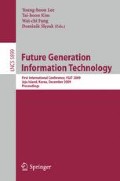Abstract
In Object Oriented (OO) systems super-imposition is a way to implement crosscutting concerns that introduce scattering and tangling of code components among the Types implemented along Type Hierarchies. This paper presents the results of the analysis of a set of existing Java systems to confirm and verify this assumption. The analysis was carried out exploiting a method to automatically analyse and identify the Type Fragments implementing static crosscutting concerns in OO systems.
Access this chapter
Tax calculation will be finalised at checkout
Purchases are for personal use only
Preview
Unable to display preview. Download preview PDF.
References
Bernardi, M.L., Di Lucca, G.A.: A Role-based Crosscutting Concerns Mining Approach to Evolve Java Systems Towards AOP. In: Proceedings of ESEC-FSE IWPSE-EVOL 2009, Amsterdam, The Netherlands, August 24-28. ACM, New York (2009)
Bernardi, M.L., Di Lucca, G.A.: ConAn: A tool for Identifying Crosscutting Concerns in Object Oriented Systems based on Type Hierarchy Analysis. In: Proceedings of Working Conference on Reverse Engineering, Lille, France, October 24-28. IEEE Computer Society, Los Alamitos (2009)
Bruntink, M., van Deursen, A., van Engelen, R., Tourwe, T.: On the use of clone detection for identifying crosscutting concern code. IEEE Trans. Softw. Eng. 31(10), 804–818 (2005)
Ceccato, M., Marin, M., Mens, K., Moonen, M., Tonella, P., Tourwe, T.: A qualitative comparison of three aspect mining techniques. In: 13th International Workshop on Program Comprehension, IWPC (2005)
Kiczales, G., Mezini, M.: Aspect-oriented programming and modular reasoning. In:Proceedings of the 27th international Conference on Software Engineering, ICSE 2005, St. Louis, MO, USA, May 15 - 21, pp. 49–58. ACM, New York (2005)
Marin, M., van Deursen, A., Moonen, L.: Identifying Aspects Using Fan-In Analysis. In: Proceedings of the 11th Working Conference on Reverse Engineering, WCRE, November 08 - 12, pp. 132–141. IEEE Computer Society, Washington (2004)
Masuhara, H., Kiczales, G.: Modeling Crosscutting in Aspect-Oriented Mechanisms. In: Cardelli, L. (ed.) ECOOP 2003. LNCS, vol. 2743, pp. 2–8. Springer, Heidelberg (2003)
Mezini, M., Ostermann, K.: Modules for crosscutting models. In: Rosen, J.-P., Strohmeier, A. (eds.) Ada-Europe 2003. LNCS, vol. 2655, pp. 24–44. Springer, Heidelberg (2003)
Robillard, M.P., Murphy, G.C.: Representing concerns in source code. ACM Trans. Softw. 16(1), 3 (2007)
Tonella, P., Ceccato, M.: Aspect Mining through the Formal Concept Analysis of Execution Traces. In: Proc. of the 11th Working Conference on Reverse Engineering, WCRE, November 08 - 12, pp. 112–121. IEEE Computer Society, Washington (2004)
Tonella, P., Ceccato, M.: Refactoring the Aspectizable Interfaces: An Empirical Assessment. IEEE Trans. Softw. Eng. 31(10), 819–832 (2005)
Author information
Authors and Affiliations
Editor information
Editors and Affiliations
Rights and permissions
Copyright information
© 2009 Springer-Verlag Berlin Heidelberg
About this paper
Cite this paper
Bernardi, M.L., Di Lucca, G.A. (2009). Analysing Object Type Hierarchies to Identify Crosscutting Concerns. In: Lee, Yh., Kim, Th., Fang, Wc., Ślęzak, D. (eds) Future Generation Information Technology. FGIT 2009. Lecture Notes in Computer Science, vol 5899. Springer, Berlin, Heidelberg. https://doi.org/10.1007/978-3-642-10509-8_25
Download citation
DOI: https://doi.org/10.1007/978-3-642-10509-8_25
Publisher Name: Springer, Berlin, Heidelberg
Print ISBN: 978-3-642-10508-1
Online ISBN: 978-3-642-10509-8
eBook Packages: Computer ScienceComputer Science (R0)

